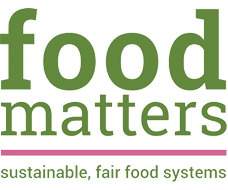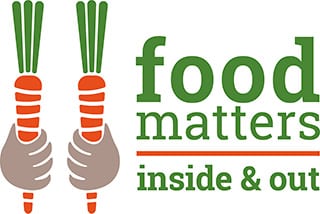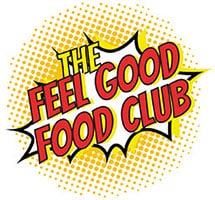Blog by Stella Clark, July 2024
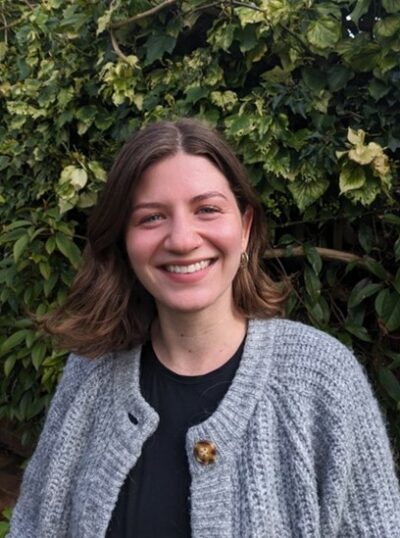
As part of my MSc in Health Promotion, I got the opportunity to do a 65-hour Community Placement where I could choose a charity I wanted to volunteer with. I have a strong interest in public health nutrition and believe in making good food accessible to everyone. Empowering people to make healthier and more sustainable choices is essential, so I was very excited to be put in touch with Food Matters. I had volunteered at the Brighton and Hove Food Partnership Community Kitchen in the past and soon learned that this was the first food partnership to be set up by Food Matters which made me even more eager to be getting involved with such an important organisation.
My role spread over around 5 months and primarily involved assisting the nutritionist and project officer with 6- or 8-week food and mental health courses for a range of different groups of people such as young care experienced people, women in the criminal justice setting and professionals supporting vulnerable individuals. Initially, I was a little apprehensive, having never worked for a charity before. However, it was a very enjoyable and rewarding experience thanks to the warmth and inclusive nature of everyone at Food Matters and the welcoming environment they create.
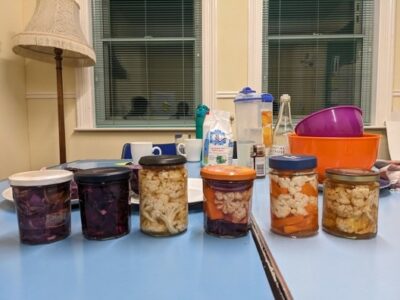
I was interested to discover more about the running of charities and the combination of food and nutrition education with more policy-focused work. Not only did I gain knowledge about this but I also had fun in the sessions, for example learning about the time it takes for food to pass through my body and how to make quick pickles. I helped prepare for sessions, learning new skills like recipe development and creating behaviour change resources. During the sessions, I supported the facilitator and participants to enhance the smooth delivery, and afterwards, reflected on the sessions to help develop future ones. As well as developing skills and experiences around facilitation and adaptation, I feel I have also understood more about the bigger picture, such as the nature of funding and negotiating relationships with other organisations. The sessions were all very engaging and inclusive and it was great to see how uplifted participants felt after the sessions. I felt lucky to have the opportunity to meet a range of people and communities I might not have met otherwise.

Something I found particularly interesting was seeing the translation and practical application of health promotion theories and approaches. Food Matters’ initiatives aim to enhance individuals’ control over their health, and central to their approach is community engagement and participation, asserting that meaningful, lasting change arises from those it affects. Food Matters ensure their sessions are participatory and co-produced, moving away from traditional education methods that are professional-led and do not always allow all voices in society to be heard. This was evident in all aspects of the community group work I was involved in, but also more generally in the nature of the work environment.
I found it equally as interesting to see the whole systems approach in practice, which emphasises the importance of a holistic approach to health and working on different levels to improve health and wellbeing. For example, engaging with and training prison officers as well as prisoners within the criminal justice system and collaborating with stakeholders such as caterers and policy makers, to advocate for change. This approach takes the focus away from the individual, accentuating the influence of the environment and facilitates reintegration into the community.
Thank you, Food Matters, for giving me this enriching opportunity and for those who shared their knowledge and skills with me. I have gained a lot and am very happy to be carrying on with some freelance work at Lambeth Food Partnership, exploring an area of Food Matters I know less about but is equally as important. I look forward to continuing working and growing in this area of work.
Blog by Stella Clark, July 2024

As part of my MSc in Health Promotion, I got the opportunity to do a 65-hour Community Placement where I could choose a charity I wanted to volunteer with. I have a strong interest in public health nutrition and believe in making good food accessible to everyone. Empowering people to make healthier and more sustainable choices is essential, so I was very excited to be put in touch with Food Matters. I had volunteered at the Brighton and Hove Food Partnership Community Kitchen in the past and soon learned that this was the first food partnership to be set up by Food Matters which made me even more eager to be getting involved with such an important organisation.
My role spread over around 5 months and primarily involved assisting the nutritionist and project officer with 6- or 8-week food and mental health courses for a range of different groups of people such as young care experienced people, women in the criminal justice setting and professionals supporting vulnerable individuals. Initially, I was a little apprehensive, having never worked for a charity before. However, it was a very enjoyable and rewarding experience thanks to the warmth and inclusive nature of everyone at Food Matters and the welcoming environment they create.

I was interested to discover more about the running of charities and the combination of food and nutrition education with more policy-focused work. Not only did I gain knowledge about this but I also had fun in the sessions, for example learning about the time it takes for food to pass through my body and how to make quick pickles. I helped prepare for sessions, learning new skills like recipe development and creating behaviour change resources. During the sessions, I supported the facilitator and participants to enhance the smooth delivery, and afterwards, reflected on the sessions to help develop future ones. As well as developing skills and experiences around facilitation and adaptation, I feel I have also understood more about the bigger picture, such as the nature of funding and negotiating relationships with other organisations. The sessions were all very engaging and inclusive and it was great to see how uplifted participants felt after the sessions. I felt lucky to have the opportunity to meet a range of people and communities I might not have met otherwise.

Something I found particularly interesting was seeing the translation and practical application of health promotion theories and approaches. Food Matters’ initiatives aim to enhance individuals’ control over their health, and central to their approach is community engagement and participation, asserting that meaningful, lasting change arises from those it affects. Food Matters ensure their sessions are participatory and co-produced, moving away from traditional education methods that are professional-led and do not always allow all voices in society to be heard. This was evident in all aspects of the community group work I was involved in, but also more generally in the nature of the work environment.
I found it equally as interesting to see the whole systems approach in practice, which emphasises the importance of a holistic approach to health and working on different levels to improve health and wellbeing. For example, engaging with and training prison officers as well as prisoners within the criminal justice system and collaborating with stakeholders such as caterers and policy makers, to advocate for change. This approach takes the focus away from the individual, accentuating the influence of the environment and facilitates reintegration into the community.
Thank you, Food Matters, for giving me this enriching opportunity and for those who shared their knowledge and skills with me. I have gained a lot and am very happy to be carrying on with some freelance work at Lambeth Food Partnership, exploring an area of Food Matters I know less about but is equally as important. I look forward to continuing working and growing in this area of work.
